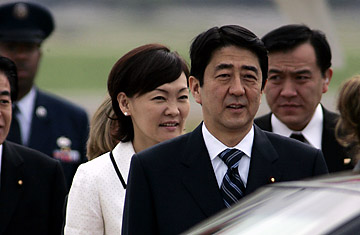
Japanese Prime Minister Shinzo Abe, center, right, and his wife Akie, arrive at Andrews Air Force in Maryland, April 26, 2007.
With U.S. moves towards a nuclear deal with North Korea another point of contention between the two sides — Japan is skeptical of North Korea's intentions — Abe will need to find a positive theme to accentuate. His best bet may be Tokyo's newest foreign policy priority: climate change. On Tuesday, Japan and the U.S. signed a landmark pact that calls for cooperative development on clean coal technology and nuclear power, including Japanese help for the first new atomic power plant in the U.S. in 30 years. Japanese media are also reporting that Abe and President George W. Bush will set a goal to cut half the world's greenhouse gas emissions by 2050. Tokyo hasn't confirmed the report, but Japanese officials have made it clear that the Abe intends to go green in Washington.
"The Prime Minister is deeply interested in climate change," says a senior Japanese foreign ministry official. "As we finish the first phase of the Kyoto [Protocol], the world will have to grapple with climate change in one way or the other."
As the world's most energy-efficient industrialized economy, Japan is in a position to extend technical assistance on the environment both to fast-developing nations such as China, and to prosperous peers such as the U.S. Whether it means nuclear power or fuel-efficient cars, if the entire world used energy like Japan, global carbon emissions would be lower. But the Japanese have always been high-tech leaders; what's new is the idea that Japan could take a political leadership position on climate change, working to broker the pacts that will replace Kyoto when the Accord, which the Bush Administration rejected, expires in 2013.
Though he's never been a vocal green, Abe seems to have seized on global warming as way for Japan to express its power in a soft way, moving the focus to the future rather than the country's controversial past. There is "a mind shift that it is politically wise to take the leadership on environmental issues," says Hye Sook Park, a professor of environmental geography at Japan's Mie University.
Green diplomacy has already borne some fruit: When Chinese Premier Wen Jiabao came to Tokyo earlier this month — the first visit to Japan by a Chinese leader in nearly seven years — the two sides kept to a minimum discussion of the painful shared history that had aggravated tensions between them, instead trumpeting plans to cooperate on the environment. Few concrete details emerged from the meetings, although a normally truculent Beijing did agree for the first time to actively discuss what should happen after Kyoto. But the summit's amicability showed that environment could provide the basis for safe diplomacy.
On Monday Japan repeated its performance with India, the world's other fast-growing carbon emitter, pledging to help New Delhi improve energy efficiency.
Japan's technical expertise is unquestioned, but its corporations have generally been reluctant to share their secrets — especially with potential competitors in countries such as China — and so far there's little evidence that Tokyo will be leaning hard on the private sector. The country also has its own environmental problems — with its long-dormant economy back in gear, carbon emissions are rising fast, and Japan will be hard-pressed to meet the Kyoto targets that were negotiated in its backyard. "Japan is moving in a very troublesome direction," says Mie Asaoka, an activist with the Kyoto-based environmental group Kiko Network.
Japanese environmentalists worry that Tokyo is drifting towards Washington's more cautious attitude on taking action over global warming action. A Japanese diplomat who deals in climate change says that Tokyo's priority is to craft a pact that will be acceptable to all major carbon emitters, including the U.S. and China, even if that means going for the lowest common denominator. After all, a global pact on restricting carbon-gas emissions will only work if it has the biggest emitters on board. Japan's objective is to craft a middle way that can bridge the gap between those who signed on to Kyoto and those who didn't. So, don't expect Prime Minister Abe to tell Bush that he needs to start hanging the White House laundry out to air-dry.
— With reporting by Yuki Oda/Tokyo
